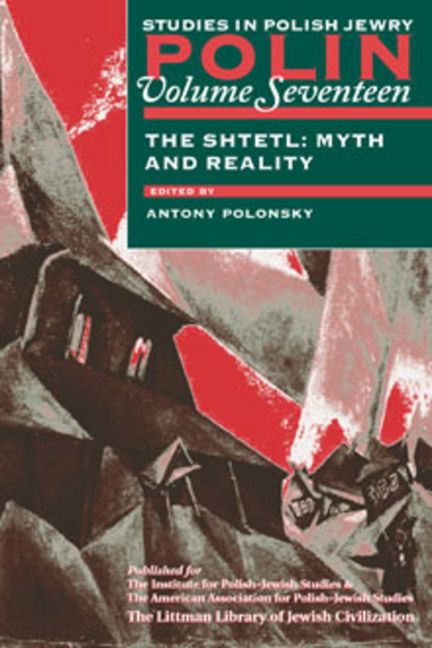Book contents
- Frontmatter
- Dedication
- Editors and Advisers
- Preface
- Polin
- Polin: Studies inPolish Jewry
- Contents
- Note on Place Names
- Note on Transliteration
- List of Abbreviations
- PART I THE SHTETL: MYTH AND REALITY
- PART II NEW VIEWS
- PART III DOCUMENTS
- PART IV THE SIXTY-FIFTH ANNIVERSARY OF EVENTS IN PRZYTYK: A DEBATE
- If Not a Pogrom, Then What?
- Pogrom? The Polish–Jewish Incidents in Przytyk, 9 March 1936
- It Was No Ordinary Fight
- Life and History
- Letter from Ryszard Fenigsen
- Przytyk and the Market Stall
- PART V REVIEWS
- OBITUARIES
- Notes on the Contributors
- Glossary
- Index
It Was No Ordinary Fight
from PART IV - THE SIXTY-FIFTH ANNIVERSARY OF EVENTS IN PRZYTYK: A DEBATE
- Frontmatter
- Dedication
- Editors and Advisers
- Preface
- Polin
- Polin: Studies inPolish Jewry
- Contents
- Note on Place Names
- Note on Transliteration
- List of Abbreviations
- PART I THE SHTETL: MYTH AND REALITY
- PART II NEW VIEWS
- PART III DOCUMENTS
- PART IV THE SIXTY-FIFTH ANNIVERSARY OF EVENTS IN PRZYTYK: A DEBATE
- If Not a Pogrom, Then What?
- Pogrom? The Polish–Jewish Incidents in Przytyk, 9 March 1936
- It Was No Ordinary Fight
- Life and History
- Letter from Ryszard Fenigsen
- Przytyk and the Market Stall
- PART V REVIEWS
- OBITUARIES
- Notes on the Contributors
- Glossary
- Index
Summary
IT is with mixed feelings that I respond to Piotr Gontarczyk's remarks to the effect that my review concerns some book that I hallucinated. The book does exist, however, and in addition to surprising conclusions that reveal biases, it contains certain detailed factual assumptions that I did not question. I do question, though, Gontarczyk's fundamental distortion of the picture of Polish–Jewish relations in the 1930s and his presentation of antisemitism and its brutal manifestations as a nearly equal ‘Polish–Jewish war’.
It is not my intention to discredit my opponent by expressing pointed personal opinions. I did not do this earlier and I will not do so now. The fact that he does so both in his book and in his latest rejoinder is offensive and embarrassing, however, since he clearly sees this as a method of ‘scholarly’ discussion. My remarks are as follows.
I am not the only one who has written about Przytyk. There are, in addition to my work—in which I devoted less than three pages to Przytyk—broader studies of the subject. I mention here an article by Joshua Rothenberg and a passage in Emanuel Melzer's book No Way Out. Gontarczyk, however, omitted American and Jewish works, as he puts it, ‘because of their lack of reliable sources and— concomitantly—their low quality’ (p. 19). In relating the events in Przytyk, I took into account not only my own findings, but also those of other historians writing on this subject, as I note in my review. Gontarczyk seems not to recognize that history is the result of the work of generations of researchers, each of whom contributes a greater or lesser piece to the edifice of our knowledge of the past.
In writing that Gontarczyk places the burden of guilt for the course of the events on the Jews, I based myself on his own statements. I cite one: ‘But the facts unequivocally indicate that the guilt for the bloody victims falls mainly on illegal actions of the Jewish “self-defence” that were tragic in their effect’ (p. 135). Elsewhere he writes that it was the Jews who committed the most serious criminal acts, organizing a ‘real hunt’ for villagers (p. 63).
- Type
- Chapter
- Information
- The Shtetl: Myth and Reality , pp. 397 - 399Publisher: Liverpool University PressPrint publication year: 2004

